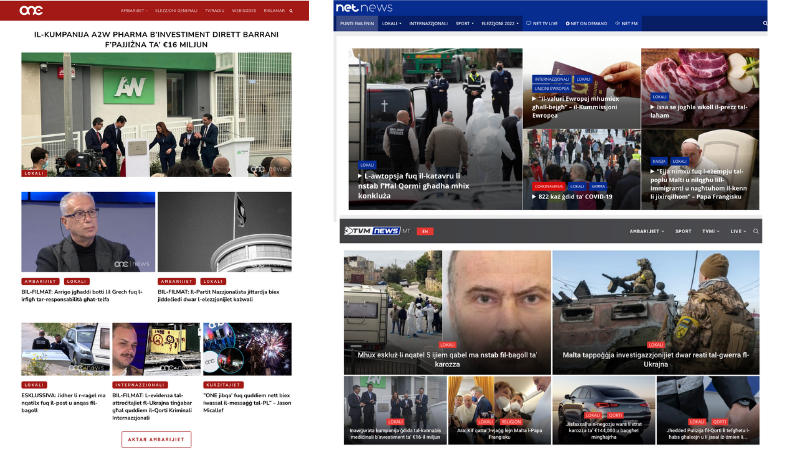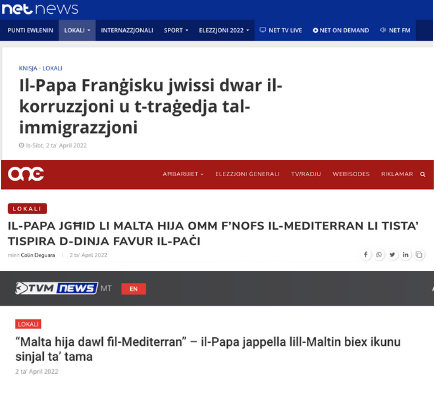A new study examining the impact of partisan media on American viewers’ beliefs and attitudes has identified three key mechanisms that are used to influence viewers and that can leave them with a warped understanding of facts and information.
These same mechanisms all feature in Malta’s peculiar media landscape and if we consider the oversized role partisan media occupies in Malta’s fractious public discourse and the complicity of the country’s public broadcaster, these findings should be concerning to us.
What influences viewers?
Political scientists from the University of California, Berkeley, and Yale University spent five years researching the effect of partisan media on people’s political views and found that while there is a lot of evidence that partisan media affects voting choices, less was known about why this might happen.
Their study is based on the theory that partisan media outlets use three types of mechanisms to influence viewers. These are ‘agenda-setting’, ‘framing’, and what is known as ‘partisan coverage filtering’.
Agenda setting refers to the topics that networks choose to cover, which in turn then influences what viewers consider to be important.
Framing is the emphasis on an aspect of a topic, while partisan coverage filtering is the process of deciding what information about a selected topic to report in the first place such as hiding information about an incumbent’s failures.
Their findings suggest that partisan media may partially affect voters’ choices because, as the researchers state, “it hides information about aligned incumbents’ failures and distorts perceptions of political rivals.”
They add that “partisan media does not only present a challenge for the opposing party, it may present a challenge for democracy which may deserve attention from policymakers”.
Why should we care?
The study’s conclusions are particularly significant when we consider how the dominance of political party-owned media in Malta, and the ramifications of a heavily biased public broadcaster, have been extensively documented and examined but remain largely ignored by our policymakers.
What’s more, the news coverage by Malta’s two main politically owned media networks offers abundant examples of the three types of mechanisms identified by the researchers used to influence viewers.
A look at the first six news items on the online portals Net (PN) and One (PL) will immediately give a basic overview of the similarities and differences between the parties’ agenda setting. For example, on 6 April at approximately 20.00, two of the six main news items on One News, were dedicated to the Nationalist Party. On Net News’ website, the main articles included the rise in the cost of meat, the number of COVID-19 infections, and the European Commission’s formal warning to Malta to stop selling passports.

Sample pages of the main news items on Net, One, and TVM wesbites on 6 April at 20.00
A manifest example of ‘framing’ was the coverage of Pope Francis’ speech during his to Malta. Shortly after his arrival, in a speech given side-by-side with President George Vella, Pope Francis spoke about how corruption impacts society. The Pontiff’s anti-corruption message made front-page news in all of Malta’s independent websites and newspapers and was also reported on the Net News’ website, but the Labour Party media and the national broadcaster instead chose to focus on the pope’s description of Malta as the “heart of the Mediterranean”.

Different framing techniques were used to report the Pope’s first speech shortly after his arrival in Malta.
The Shift also documented some examples of what can be described as a ‘partisan coverage filter’ when it made a cursory analysis of TVM’s news and social media platforms to show that the public broadcaster and the Labour Party’s media outfit under-report or ignore stories that cast the prime minister, the government, and the Labour Party in a bad light.

Tweets about Abela’s dinner with Joseph Portelli.
From Fox News to CNN and back again
To test their hypotheses, the researchers recruited a sample of Fox News (a right-wing network) viewers, all very conservative and strong Republicans, and paid some of them to watch CNN (a left-wing network) for about seven hours per week during the month of September 2020. The rest of the participants were assigned to the control group and continued to watch Fox News. Both groups then answered three follow-up surveys about the news.
The survey results revealed that CNN and Fox covered different topics during September 2020. CNN focussed on COVID-19 and President Donald Trump’s poor handling of the pandemic while Fox News covered extensively (but highly selectively) racial issues.
The evidence also shows that the audience of committed Fox viewers, which started the month with conservative predispositions, changed their minds on certain issues. Those that had watched CNN were more likely to see COVID-19 as important, were more likely to change their evaluation of, and views on, Donald Trump and were more likely to agree that if Trump made a mistake Fox News wouldn’t cover it.
One aspect of this result is that contrasts with the conventional wisdom that highly engaged American partisans reject information from an opposing source that goes against their partisan loyalties but they also found that the participants don’t change their overall political stance and that several weeks after the survey, the impacts of watching CNN had largely receded as most of the participants went back to their old viewing habits.
What if?
What could all this tell us about the effects of Malta’s partisan media coverage? Could Labour party supporters be persuaded to consider politicians’ malfeasance differently if the public broadcaster used less partisan filtering and added more context to its reports about improper behaviour in politicians? Would private individuals be less targeted if One News refrained from naming them in its reports?
Malta and the USA are two very different countries with different political and media landscapes, and studies on American audiences need to be evaluated keeping our own set of considerations in mind such as our population size, language and viewing habits.
Nevertheless, the aspects of the study that shed light on the challenges that partisan media poses for democratic accountability cannot, and should not, be ignored.
The complete study can be found here.













Suggested reading;
The Wave by Todd Strasser.
or viewing;
https://www.imdb.com/title/tt0083316/